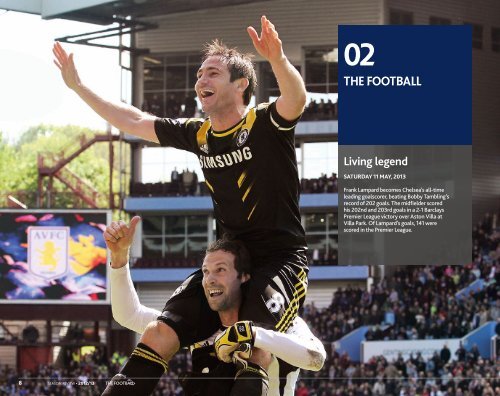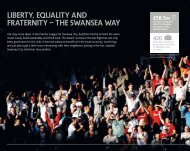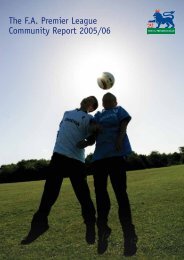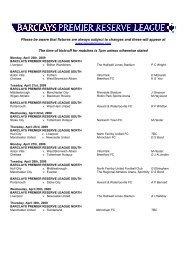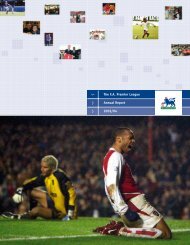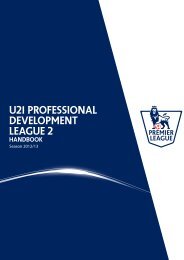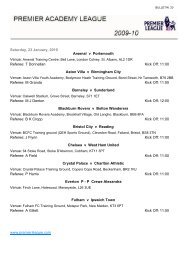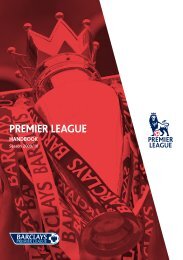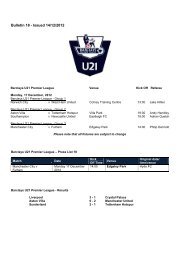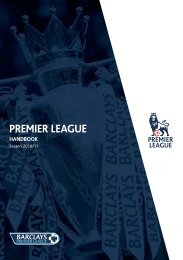Download the chapter - Season Review 2012/13
Download the chapter - Season Review 2012/13
Download the chapter - Season Review 2012/13
Create successful ePaper yourself
Turn your PDF publications into a flip-book with our unique Google optimized e-Paper software.
02<br />
THE FOOTBALL<br />
Living legend<br />
SATURDAY 11 MAY, 20<strong>13</strong><br />
Frank Lampard becomes Chelsea’s all-time<br />
leading goalscorer, beating Bobby Tambling’s<br />
record of 202 goals. The midfielder scored<br />
his 202nd and 203rd goals in a 2-1 Barclays<br />
Premier League victory over Aston Villa at<br />
Villa Park. Of Lampard’s goals, 141 were<br />
scored in <strong>the</strong> Premier League.<br />
8<br />
SEASON REVIEW • <strong>2012</strong>/<strong>13</strong><br />
THE FOOTBALL
THE <strong>2012</strong>/<strong>13</strong> SEASON • THE FACTS<br />
Baines trust: Leighton Baines was<br />
<strong>the</strong> only outfield player to feature<br />
in every minute of <strong>the</strong> <strong>2012</strong>/<strong>13</strong><br />
campaign. He became only <strong>the</strong> sixth<br />
player in Barclays Premier League<br />
history to have played every minute<br />
of <strong>the</strong> season – twice.<br />
Young and old: Liverpool had<br />
<strong>the</strong> youngest goalscorer this<br />
season – Raheem Sterling versus<br />
Reading, 17 years and 216 days.<br />
Manchester United had <strong>the</strong> oldest<br />
goalscorer – Ryan Giggs versus<br />
Everton, 39 years and 73 days.<br />
116<br />
LEIGHTON BAINES<br />
CREATED THE MOST<br />
GOALSCORING<br />
CHANCES<br />
5-5<br />
2.8<br />
GOALS PER GAME<br />
FOR THE THIRD<br />
SEASON IN A ROW.<br />
BEFORE 2010/11, NO<br />
SEASON HAD REACHED<br />
THIS AVERAGE<br />
14<br />
17<br />
YEARS AND 216 DAYS, THE<br />
YOUNGEST GOALSCORER<br />
79%<br />
THERE WERE<br />
86 PENALTIES<br />
AWARDED AND<br />
68 SCORED,<br />
A SUCCESS<br />
RATE OF 79%<br />
DRAW BETWEEN WEST BROMWICH<br />
ALBION AND MANCHESTER UNITED ON<br />
THE FINAL DAY OF THE <strong>2012</strong>/<strong>13</strong> SEASON<br />
WAS THE FIRST 5-5 DRAW IN PREMIER<br />
LEAGUE HISTORY<br />
+28<br />
LIVERPOOL’S GOAL<br />
DIFFERENCE, THE BEST EVER<br />
RECORDED BY A TEAM<br />
OUTSIDE THE TOP SIX<br />
ROBIN VAN PERSIE<br />
BECAME THE FIRST<br />
PLAYER TO SCORE 10+<br />
AWAY GOALS IN THREE<br />
DIFFERENT PREMIER<br />
LEAGUE SEASONS<br />
EMIRATES STADIUM<br />
SAW MORE GOALS<br />
THAN ANY OTHER<br />
STADIUM<br />
70<br />
RVP = MVP: Robin van Persie became<br />
only <strong>the</strong> third different player to win <strong>the</strong><br />
Barclays Premier League Golden Boot<br />
award with two different clubs (Arsenal<br />
and Manchester United), after Alan<br />
Shearer and Jimmy Floyd Hasselbaink.<br />
Scoring, scoring Arsenal: Four<br />
different Arsenal players – Theo Walcott,<br />
Santi Cazorla, Olivier Giroud and Lucas<br />
Podolski – scored 10 or more goals in<br />
<strong>the</strong> <strong>2012</strong>/<strong>13</strong> Barclays Premier League<br />
season, meaning that <strong>the</strong> Gunners are<br />
only <strong>the</strong> fourth side in history to have<br />
four players reach double figures in a<br />
single Barclays Premier League campaign.<br />
THE FOOTBALL <strong>2012</strong>/<strong>13</strong> • SEASON REVIEW 9
BALE<br />
AND PACE<br />
PFA Players’ Player of Year, PFA Young Player of <strong>the</strong><br />
Year, FWA Footballer of <strong>the</strong> Year, Barclays Player<br />
of <strong>the</strong> Year, <strong>the</strong> awards said it all; in <strong>the</strong> <strong>2012</strong>/<strong>13</strong><br />
Premier League season, Gareth Bale was first among<br />
equals. Although supremely talented, <strong>the</strong> Tottenham Hotspur<br />
midfielder is an extremely modest man. Here he explains how<br />
he couldn’t have won <strong>the</strong> awards alone, but that <strong>the</strong>y didn’t<br />
arrive by luck, and he still has much to learn.<br />
I’ve always had natural talent but it wasn’t always to<br />
my advantage. In P.E. lessons at school, because <strong>the</strong> teacher<br />
thought I was quite good, I wasn’t allowed to use my left foot<br />
and got restricted to one touch. I always used to sneak a left<br />
foot shot away now and again when he wasn’t looking. At <strong>the</strong><br />
time it annoyed me a little bit, because as a kid you just want<br />
to run through a team and try and score goals. But looking back<br />
it was good for my development and I’ve got great memories<br />
of playing in school with my friends. But that’s what football<br />
should be: fun.<br />
It looks like I picked up awards for fun but I’m deeply<br />
honoured. To be voted <strong>the</strong> best of anything is a great tribute.<br />
It’s humbling to be voted <strong>the</strong> Players’ Player of <strong>the</strong> Year by <strong>the</strong><br />
guys that you step onto a pitch and compete with. The Football<br />
Writers’ Award too – <strong>the</strong>y watch us players week in, week out,<br />
so <strong>the</strong>y have good opinions of <strong>the</strong> game. If you look at all <strong>the</strong><br />
past winners of those awards <strong>the</strong>y’re all legends of <strong>the</strong> game<br />
and to share that with <strong>the</strong>m now is a massive privilege.<br />
But in football you don’t win anything on your own.<br />
I’ve always said that everything I’ve achieved is down to my<br />
teammates. As a unit we worked so hard last season and<br />
I wasn’t anything without <strong>the</strong>m.<br />
It’s <strong>the</strong> same with records; I tend to let o<strong>the</strong>r people think<br />
about <strong>the</strong>m. I don’t start a season thinking I’m going to break<br />
a record, but it was decent to be <strong>the</strong> first Tottenham Hotspur<br />
player since Jürgen Klinsmann to score over 20 Premier League<br />
goals. When you look back at <strong>the</strong> season and you find you<br />
have done that it is something to be very proud of.<br />
I’m also very proud to be part of this Tottenham Hotspur team.<br />
In every way possible <strong>the</strong> team has been fantastic this year. We<br />
went on good runs and had a few blips, but we always bounced back.<br />
There is confidence and belief in this team. The manager has given<br />
us that and I think it’s showed in every game we’ve played in.<br />
I certainly wouldn’t like to play at home against us. When teams<br />
are on <strong>the</strong>ir own patch <strong>the</strong>y will obviously attack but we have an<br />
abundance of pace to hit teams on <strong>the</strong> counter attack. That fell<br />
into our hands a little last season for us a team; and me as a<br />
player because <strong>the</strong> majority of my goals came away from home.<br />
Confidence is like <strong>the</strong> old Gary Player line, <strong>the</strong> more you<br />
practice <strong>the</strong> luckier you get. I worked hard at my game and I<br />
loved <strong>the</strong> free role I had last season. Andre Villas-Boas has been<br />
fantastic for me, playing me in different positions where I’m able<br />
to find <strong>the</strong> space and show my stuff. No-one wants to be stuck<br />
on <strong>the</strong> wing where you get a couple of markers put on you to<br />
take you out of <strong>the</strong> game. That free role is fantastic; you can go<br />
for a wander and try and find <strong>the</strong> space to affect games pretty<br />
much for <strong>the</strong> 90 minutes. But I’ve also been practising my new<br />
role in training all season and working incredibly hard with <strong>the</strong><br />
manager on tactics, so what we achieved was not by accident.<br />
It helps also that I’ve never been fitter. When you’re coming in<br />
to <strong>the</strong> last ten minutes of a game and you know you need to win,<br />
sometimes a player ups <strong>the</strong>ir game a bit. On a Premier League<br />
pitch I feel going in to <strong>the</strong> last ten minutes that I’m one of <strong>the</strong><br />
strongest on <strong>the</strong> pitch with my fitness, so I’ve been able to<br />
contribute at good times in <strong>the</strong> game and I was a decent help<br />
to <strong>the</strong> team last season.<br />
The reason I’m playing so well is I’m enjoying life. I’ve started<br />
a family and I work in a great environment at Spurs, so I really<br />
enjoyed last season very much.<br />
But I’ve still much to learn. I’ve only started last season in that<br />
free role position so my journey <strong>the</strong>re has just started. There are<br />
still aspects of every part of my game that I need to improve. I say<br />
to myself at <strong>the</strong> beginning of every season I want to improve again<br />
and 20<strong>13</strong>/14 will be no different.<br />
10<br />
SEASON REVIEW • <strong>2012</strong>/<strong>13</strong><br />
THE FOOTBALL
02<br />
THE FOOTBALL<br />
SEASON<br />
OF LOVE<br />
9Gareth Bale scored more winning goals<br />
than any o<strong>the</strong>r player in <strong>the</strong> <strong>2012</strong>/<strong>13</strong><br />
Barclays Premier League season.<br />
<strong>13</strong><br />
Gareth Bale scored <strong>13</strong> goals away from<br />
home and became <strong>the</strong> first Tottenham<br />
Hotspur player to score over 12 away<br />
goals in a Barclays Premier League season.<br />
16<br />
Tottenham Hotspur scored 16 goals from<br />
outside of <strong>the</strong> box, more than any o<strong>the</strong>r<br />
side. Gareth Bale got nine of those goals.<br />
25<br />
Gareth Bale’s goals won 25 points during<br />
<strong>the</strong> campaign; only Robin van Persie’s<br />
won more (26).<br />
73<br />
The most shots on target in <strong>the</strong><br />
Barclays Premier League.<br />
THE FOOTBALL<br />
<strong>2012</strong>/<strong>13</strong> • SEASON REVIEW 11
HIGH<br />
FIVE<br />
The imperious champions,<br />
<strong>the</strong> Welsh conquistador,<br />
<strong>the</strong> fantastic goals, <strong>the</strong><br />
dramatic matches and <strong>the</strong><br />
final farewells: <strong>the</strong> <strong>2012</strong>/<strong>13</strong><br />
Barclays Premier League<br />
story told in five vignettes.<br />
HOW THE TITLE WAS WON<br />
Manchester United’s <strong>13</strong>th Premier League title might not have<br />
had <strong>the</strong> final day excitement with which <strong>the</strong>ir neighbours City<br />
were crowned 2011/12 champions – but it did prove that quality<br />
always wins out in <strong>the</strong> end.<br />
It is hard to argue with <strong>the</strong> statistics that United deserved<br />
to be champions: <strong>the</strong>y won more games (28), scored more<br />
goals (86) and lost fewer games (five) than anyone else,<br />
while <strong>the</strong>y also boasted <strong>the</strong> Barclays Premier League’s top<br />
scorer in Robin van Persie (above) with 26 goals.<br />
The flying Dutchman was <strong>the</strong> key to <strong>the</strong>ir success. From<br />
his spectacular first goal in his opening home game against<br />
Fulham to <strong>the</strong> hat-trick which snatched victory from defeat<br />
at Southampton a week later, <strong>the</strong> former Arsenal striker<br />
played a crucial role throughout.<br />
Among o<strong>the</strong>r highlights from Robin van Persie were<br />
his injury-time winner at <strong>the</strong> Etihad Stadium in December,<br />
which put United six points clear of City at <strong>the</strong> top, and<br />
<strong>the</strong> hat-trick against Aston Villa which secured <strong>the</strong> title<br />
with four games to go.<br />
The Red Devils went top of <strong>the</strong> table in mid-November<br />
and although Manchester City stayed behind <strong>the</strong>m in second,<br />
United were not overtaken for <strong>the</strong> rest of <strong>the</strong> campaign.<br />
They were worthy champions.<br />
PLEASED TO MICHU<br />
Welshman Gareth Bale may have been <strong>the</strong> man who<br />
hoovered up <strong>the</strong> main player of <strong>the</strong> year awards last season,<br />
but if <strong>the</strong>re was a prize for best signing of <strong>the</strong> season it<br />
belonged in his homeland.<br />
The likes of Robin van Persie, Eden Hazard and Santi Cazorla<br />
were <strong>the</strong> big money buys that many expected to do well, but<br />
arguably <strong>the</strong> deal that eclipsed <strong>the</strong>m all was Swansea City’s<br />
£2m signing of Michu (below) from Rayo Vallecano.<br />
When Swans boss Michael Laudrup bought <strong>the</strong> attacking<br />
midfielder from <strong>the</strong> lower mid-table La Liga side, it meant<br />
little to supporters of o<strong>the</strong>r clubs. But when he hit six goals<br />
in his first eight Premier League games and led <strong>the</strong> division’s<br />
scoring charts in <strong>the</strong> early part of <strong>the</strong> season, people began<br />
to take notice.<br />
The 27-year-old finished <strong>the</strong> campaign with 18 Barclays Premier<br />
League goals, and 22 in all competitions, and helped Swansea<br />
confound <strong>the</strong> critics who thought <strong>the</strong>y might struggle after <strong>the</strong><br />
departure of Brendan Rodgers and Joe Allen to Liverpool.<br />
But <strong>the</strong> Swans spent almost <strong>the</strong> entire season in <strong>the</strong> top<br />
half of <strong>the</strong> table, finishing ninth, and picked up <strong>the</strong>ir first<br />
major trophy when <strong>the</strong>y won <strong>the</strong> Capital One Cup.<br />
12 SEASON REVIEW • <strong>2012</strong>/<strong>13</strong> THE FOOTBALL
02<br />
THE FOOTBALL<br />
THAT’S ENTERTAINMENT<br />
Exciting football is what <strong>the</strong> Barclays Premier League does best.<br />
These matches enhanced that reputation.<br />
Dec 9 – Manchester City 2-3 Manchester United<br />
This game between <strong>the</strong> top two had it all with leaders United’s<br />
2-0 half-time lead being wiped out by second-placed City in <strong>the</strong><br />
86th minute, only for Robin van Persie’s deflected injury-time<br />
free-kick to win it and send <strong>the</strong> visitors six points clear.<br />
Dec 23 – Chelsea 8-0 Aston Villa<br />
Almost <strong>the</strong> perfect performance with seven different players<br />
on <strong>the</strong> scoresheet as Chelsea tore apart a Villa side who had<br />
won at Anfield a week earlier.<br />
GOALS, GOALS, GOALS<br />
The goals of Robin van Persie, Gareth Bale, and Luis Suarez<br />
provided plenty of thrilling moments and we examine <strong>the</strong>ir<br />
exploits more closely on p14-15. But <strong>the</strong>y weren’t <strong>the</strong> only<br />
ones to score spectacular goals during <strong>the</strong> campaign.<br />
Mat<strong>the</strong>w Lowton – Stoke City v Aston Villa<br />
Relegation rivals Villa and Stoke were locked at 1-1 with<br />
minutes remaining when <strong>the</strong> ball was cleared to full-back<br />
Lowton (above), who chested it down and volleyed an<br />
unstoppable 30-yard shot into <strong>the</strong> top corner. Villa won<br />
3-1 and weren’t in <strong>the</strong> bottom three again.<br />
Cameron Jerome – Stoke City v Southampton<br />
Saints, with one away win to <strong>the</strong>ir credit, had led 3-1 at<br />
half-time but second half substitute Jerome completed<br />
Stoke’s comeback with a thunderbolt volley from 25 yards<br />
out that screamed into <strong>the</strong> net.<br />
David Luiz – Fulham v Chelsea<br />
Oscar played <strong>the</strong> ball across <strong>the</strong> midfield to <strong>the</strong> unmarked Luiz<br />
midway inside <strong>the</strong> Fulham half. He took two steps, looked up and<br />
unleashed a ferocious shot which arrowed past Mark Schwarzer.<br />
Theo Walcott – Arsenal v Newcastle United<br />
Arsenal were 6-3 up in injury-time when Walcott collected<br />
<strong>the</strong> ball on <strong>the</strong> edge of <strong>the</strong> area and jinked past two defenders.<br />
He fell to <strong>the</strong> ground but managed to get past two more before<br />
standing up and completing his hat-trick from an acute angle.<br />
Dec 29 – Arsenal 7-3 Newcastle United<br />
A simply extraordinary match in which Newcastle equalised<br />
three times before four Arsenal goals in <strong>the</strong> final 20 minutes,<br />
including two to seal a fine hat-trick from Theo Walcott,<br />
finally ended <strong>the</strong>ir resistance.<br />
Feb 25 – West Ham 2-3 Tottenham Hotspur<br />
Gareth Bale’s magical season continued with Tottenham’s<br />
first and last goals – <strong>the</strong> winner a 90th minute spectacular<br />
long-range effort.<br />
April 19 – Newcastle United 0-3 Sunderland<br />
Manager Paolo Di Canio (below) made himself an instant hero<br />
with Sunderland fans for <strong>the</strong>ir first derby win at St James’ Park<br />
since November 2000. Stéphane Sessègnon blasted <strong>the</strong> visitors<br />
into a first-half lead and stunning strikes by Adam Johnson<br />
and substitute David Vaughan ensured a famous victory.<br />
THANKS FOR THE MEMORIES<br />
Ryan Giggs may be preparing for his 22nd consecutive<br />
season of Premier League football in August 20<strong>13</strong> – but<br />
several o<strong>the</strong>r familiar faces bid farewell last season.<br />
Sir Alex Ferguson, Paul Scholes, Jamie Carragher (above),<br />
Phil Neville, Michael Owen and Stiliyan Petrov all announced<br />
<strong>the</strong>ir retirements – taking with <strong>the</strong>m <strong>the</strong> experience of<br />
2,834 Premier League matches.<br />
The most notable of all of course is Ferguson, who took<br />
charge of 810 Premier League games for United and won<br />
<strong>the</strong> title <strong>13</strong> times. England internationals Scholes, Neville<br />
and Owen all played for Ferguson at Old Trafford.<br />
Scholes, once dubbed by <strong>the</strong> great Zinedine Zidane<br />
as “<strong>the</strong> complete midfielder”, retired for <strong>the</strong> second time<br />
while Neville, in <strong>the</strong> same United youth team as Scholes<br />
and Giggs, was a first-teamer for ten years before spending<br />
eight years at Everton.<br />
Owen came to Old Trafford near <strong>the</strong> end of his career<br />
after enjoying his most successful spell with Liverpool.<br />
Anfield was of course <strong>the</strong> 17-year home of Jamie Carragher –<br />
a man so committed to his club that Liverpool fans serenaded<br />
him with “We all dream of a team of Carraghers.”<br />
Finally Petrov, who spent seven years with Aston Villa after<br />
enjoying <strong>the</strong> previous seven at Celtic, retired after recovering<br />
from leukaemia. His bravery was an inspiration to all.<br />
THE FOOTBALL <strong>2012</strong>/<strong>13</strong> • SEASON REVIEW <strong>13</strong>
Think strikers are alike? Then think again. These<br />
Opta datagraphs of <strong>the</strong> Premier League’s five leading<br />
scorers in <strong>the</strong> <strong>2012</strong>/<strong>13</strong> season show how diverse<br />
<strong>the</strong>y are. From <strong>the</strong> way <strong>the</strong>ir goals are clustered<br />
to how often and where <strong>the</strong>y’re taking shots from.<br />
FORWARD THINKING<br />
With Alan Shearer<br />
How to make sense of this? Well who better to ask<br />
than Alan Shearer (below), <strong>the</strong> Premier League’s<br />
all-time leading goalscorer with 260 goals.<br />
The secret to Shearer’s success, beyond talent, was<br />
knowing his enemy. “Whoever I played against I always<br />
wanted to find out how <strong>the</strong>y ticked,” says <strong>the</strong> Premier<br />
League winner and BBC Match of <strong>the</strong> Day pundit.<br />
“Whe<strong>the</strong>r it was centre-halves or goalkeepers,<br />
before I played <strong>the</strong>m I always knew <strong>the</strong>ir weaknesses,<br />
<strong>the</strong>ir strengths and if I’d played <strong>the</strong>m before, what<br />
had happened. I always did my homework and I<br />
assumed most people did that. If I was a defender<br />
now I’d be fascinated by this because <strong>the</strong>se guys are<br />
<strong>the</strong> secret to a successful Premier League season.”<br />
ROBIN VAN PERSIE<br />
Manchester United<br />
Robin van Persie is a very<br />
productive player. Notice <strong>the</strong>re<br />
are a few shots from outside <strong>the</strong><br />
area. But inside he’s got <strong>the</strong> lot:<br />
he’s skilful, he’s pacy, he’ll run in<br />
behind, he’ll score spectacular goals, he’ll score tap-ins,<br />
he’ll score headers, he’ll score all sorts of goals. It helps<br />
that he plays in a team that creates chances for him<br />
week in, week out. But he’s rewarded <strong>the</strong>m by putting<br />
<strong>the</strong> vast majority away. His volleyed goal against<br />
Aston Villa was my goal of <strong>the</strong> season.<br />
LUIS SUÁREZ<br />
Liverpool<br />
He’s a very different player<br />
to van Persie. With Luis, you’ll<br />
see him try a lot more dribbles,<br />
both inside <strong>the</strong> area and outside.<br />
Technically speaking a lot of people<br />
think that when he does <strong>the</strong>se little dribbles that <strong>the</strong><br />
ball ricochets to him and he’s a little bit fortunate.<br />
But it’s not luck, it’s because he’s so clever and so good<br />
at dribbling with <strong>the</strong> ball close to his feet. Of all <strong>the</strong><br />
strikers on this list I would say that he’s <strong>the</strong> most<br />
important player to his club.<br />
KEY<br />
GOAL<br />
MISSED, BLOCKED OR ATTEMPTED SHOTS<br />
26<br />
GOALS<br />
141<br />
SHOTS<br />
23<br />
GOALS<br />
187<br />
SHOTS<br />
14 SEASON REVIEW • <strong>2012</strong>/<strong>13</strong> THE FOOTBALL
02<br />
THE FOOTBALL<br />
GARETH BALE<br />
Tottenham Hotspur<br />
It seemed that every week<br />
working on Match of <strong>the</strong> Day<br />
we’d be talking about a Bale<br />
wondergoal. But he’s different<br />
from <strong>the</strong> o<strong>the</strong>rs, inasmuch as<br />
he’s more keen on taking pot shots. Everyone knows how strong<br />
his left foot shot is, but it’s one thing knowing about it and it’s<br />
ano<strong>the</strong>r thing stopping it. Some coaches think you should try to<br />
stop him from cutting inside from that right side on to his left foot,<br />
but I think that’s virtually impossible. When he’s running at that<br />
pace, you can’t stop him.<br />
CHRISTIAN BENTEKE<br />
Aston Villa<br />
He’s a bully and I really enjoyed<br />
watching him progress last season.<br />
In one or two of <strong>the</strong> early games<br />
you could see he was new to <strong>the</strong> Premier League,<br />
but by <strong>the</strong> end of <strong>the</strong> season he was knocking defenders<br />
off <strong>the</strong> ball to score all types of goals. His graph shows he<br />
had <strong>the</strong> fewest number of shots but he still scored 19 goals,<br />
which indicates great efficiency. And not bad considering<br />
he was playing in a struggling side.<br />
MICHU<br />
Swansea City<br />
This graph emphasises how<br />
different <strong>the</strong>se players are.<br />
If you compare him with<br />
Gareth Bale for example,<br />
it’s clearly not Michu’s forte<br />
to shoot from outside <strong>the</strong> box. His strength is in and around <strong>the</strong><br />
area, drifting away from players, being in <strong>the</strong> right space at <strong>the</strong><br />
right time. But once you’re in that place you’ve got to finish off,<br />
and <strong>the</strong>re’s a million guys that can be in <strong>the</strong> right place at <strong>the</strong> right<br />
time but not all of <strong>the</strong>m can put it away. This guy can, which is<br />
why he was <strong>the</strong> bargain of <strong>the</strong> season.<br />
21<br />
GOALS<br />
165<br />
SHOTS<br />
19<br />
GOALS<br />
104<br />
SHOTS<br />
18<br />
GOALS<br />
110<br />
SHOTS<br />
THE FOOTBALL <strong>2012</strong>/<strong>13</strong> • SEASON REVIEW 15
GOING<br />
TO PLAN<br />
After three years of consultation and<br />
development, <strong>the</strong> Elite Player Performance<br />
Plan (EPPP) came into force at <strong>the</strong> beginning<br />
of <strong>the</strong> <strong>2012</strong>/<strong>13</strong> season, seeking to create<br />
more and better homegrown players who<br />
are properly equipped to succeed at <strong>the</strong><br />
highest level.<br />
While <strong>the</strong> EPPP is geared towards <strong>the</strong> long term,<br />
with clubs putting in £340m over <strong>the</strong> first four<br />
years, we speak to three senior coaches about<br />
specific aspects of <strong>the</strong> Plan that have made it<br />
a success in its first 12 months.<br />
PHILOSOPHY – HOW DOES<br />
YOUR CLUB WANT TO PLAY?<br />
By Neil Bath, Academy Manager, Chelsea<br />
Why does a football club need a philosophy?<br />
Well, it would be like going into a school that<br />
doesn’t have a syllabus and not being sure<br />
what is being taught from one year to <strong>the</strong> next.<br />
What <strong>the</strong> EPPP ensures is that all parts of<br />
<strong>the</strong> club are travelling in <strong>the</strong> same direction.<br />
We work toge<strong>the</strong>r so that <strong>the</strong> Under-18s coach<br />
knows what <strong>the</strong> Under-9s and Under-11s coach<br />
is doing and <strong>the</strong> next group knows what <strong>the</strong><br />
Under-12s and Under-16s are doing. We are<br />
in a 10-year development programme here,<br />
not just for us but for <strong>the</strong> player too.<br />
Developing a coherent playing philosophy<br />
has been central to our work in <strong>the</strong> Chelsea<br />
Academy for several years and we look<br />
at three areas with a view to joining <strong>the</strong><br />
first team.<br />
First, <strong>the</strong>re’s <strong>the</strong> way <strong>the</strong> actual teams<br />
are coached and play, and we play a certain<br />
way that we feel is <strong>the</strong> best technical and<br />
tactical way to develop our players.<br />
Second, <strong>the</strong>re are individual<br />
programmes, because every player<br />
is different. We build bespoke<br />
plans around <strong>the</strong> disciplines<br />
of technical/tactical,<br />
physical/movement, lifestyle, mentality and<br />
injury prevention.<br />
Finally, <strong>the</strong>re’s performance education. We<br />
asked ourselves <strong>the</strong> following question: how can<br />
we educate <strong>the</strong> players to become bright, young<br />
professionals on and off <strong>the</strong> field in terms of<br />
making better decisions? Performance education<br />
seeks to provide players with <strong>the</strong> tools to be<br />
effective professionals on and off <strong>the</strong> field.<br />
As a result of <strong>the</strong> EPPP, youth coaching is<br />
moving forward and away from <strong>the</strong> old views<br />
that ‘this is my team and I’ll do it my way’.<br />
Now we have a culture where <strong>the</strong> coach needs<br />
to be far more rounded and his coaching is part<br />
of a longer-term plan. To go out with a bag of<br />
balls and coach off <strong>the</strong> cuff is not acceptable.<br />
Coaches need to be world-class level –<br />
that means planning in detail, attention to<br />
that detail, ensuring you are delivering <strong>the</strong><br />
club philosophy and not your own philosophy.<br />
The priority remains <strong>the</strong> quality of what a<br />
coach does on <strong>the</strong> field with his players. Now we<br />
are raising <strong>the</strong> bar and requiring higher standards<br />
of <strong>the</strong> coach. If coaches can show us evidence of<br />
<strong>the</strong>ir planning, as well as what <strong>the</strong>y are doing with<br />
<strong>the</strong> knowledge and experience <strong>the</strong>y have, and<br />
give a bit more feedback than <strong>the</strong>y have done in<br />
<strong>the</strong> past, <strong>the</strong>n surely that’s best practice and only<br />
going to improve <strong>the</strong> quality of <strong>the</strong> players we<br />
are seeking to produce for <strong>the</strong> first team.<br />
LEADERSHIP – BUILDING A WORLD-<br />
LEADING COACHING FRATERNITY<br />
By Terry Burton, Head Development Coach,<br />
Arsenal<br />
There has always been room for improvement<br />
in <strong>the</strong> way that coaches learn in this country.<br />
A generation of coaches ago <strong>the</strong>re was no<br />
time for it until <strong>the</strong> end of <strong>the</strong> season, when<br />
we went up to The FA’s former national school<br />
at Lilleshall for a week and virtually every<br />
coach around would go to it. Best practice<br />
was shared and people like Don Howe, Dave<br />
Sexton and Malcolm Allison would put on<br />
sessions. It was great, just not regular enough.<br />
It’s required <strong>the</strong> introduction of <strong>the</strong> EPPP to<br />
realise that coaches all want to move forward<br />
and continue gaining knowledge. So <strong>the</strong><br />
Premier League’s Leadership events are<br />
excellent. They’re doing <strong>the</strong> organising,<br />
making sure we’re being put in front of <strong>the</strong><br />
right people and in <strong>the</strong> right environment.<br />
It is about giving us insights to help us do<br />
our jobs better: philosophy, psychology, how<br />
to develop ideas that guide talent. What works<br />
is that <strong>the</strong>y’re very practical. It’s someone with<br />
expertise in each of <strong>the</strong>se areas giving you a<br />
lecture about how <strong>the</strong>y have done it and <strong>the</strong>n<br />
practically going pitch-side to see how it can<br />
be applied in <strong>the</strong> club.<br />
I found one we did in March with Professor<br />
Geir Jordet, a Norwegian sports psychologist,<br />
brilliant. Sports psychology chats can often<br />
be a little highbrow but this was really well<br />
applied and relevant to football coaches.<br />
16 SEASON REVIEW • <strong>2012</strong>/<strong>13</strong> THE FOOTBALL
02<br />
THE FOOTBALL<br />
We talk about English football not being great for<br />
possession-based football and that it is too direct;<br />
well I see <strong>the</strong> opposite of that in Under-21 football.”<br />
RICKY MARTIN<br />
We often talk about <strong>the</strong> need for players<br />
to know what is happening before <strong>the</strong>y receive<br />
<strong>the</strong> ball, and to see what <strong>the</strong> next option is in<br />
terms of a pass, a dribble or a shot. It is <strong>the</strong><br />
simple thing of looking, but it is very hard to<br />
get young players to do this. He gave some<br />
great examples based on Frank Lampard.<br />
One was only a 90-second clip but it captured<br />
him scanning, looking, checking his shoulders<br />
without ever touching <strong>the</strong> ball until really late<br />
on in <strong>the</strong> move, and <strong>the</strong>n he scored. I’ve now<br />
used <strong>the</strong> clip many times with our players.<br />
The opportunity to discuss <strong>the</strong>se types<br />
of issues with coaching<br />
colleagues and experts<br />
has been worthwhile.<br />
The Leadership events<br />
ei<strong>the</strong>r reinforce what<br />
you are doing or, as in<br />
many cases, you see<br />
something neat and<br />
you think “I like<br />
that I could do<br />
this” and “I could<br />
add that to it”.<br />
So it’s not only<br />
benefitting us<br />
as coaches, it is<br />
benefitting player<br />
development too.<br />
GAMES PROGRAMME – INCREASING<br />
THE STANDARD OF COMPETITION<br />
By Ricky Martin, Academy Manager,<br />
Norwich City<br />
The new Barclay’s Under-21 Premier League has<br />
been a great addition to <strong>the</strong> Games Programme.<br />
There’s more competition because teams are<br />
now more evenly matched.<br />
The old reserve team football was more<br />
random. In <strong>the</strong> past I’ve experienced reserve<br />
matches where you travel and play eight or<br />
nine senior professionals because <strong>the</strong> manager<br />
was happy for <strong>the</strong>m to play at <strong>the</strong>ir home<br />
ground. But <strong>the</strong>n you play <strong>the</strong> same club in<br />
<strong>the</strong> return fixture and none of those guys are<br />
<strong>the</strong>re. That just created inconsistency and a<br />
lack of opportunities for younger players.<br />
But this new league has enabled <strong>the</strong><br />
Under-21 managers to improve <strong>the</strong> pathway<br />
for players. They can create a team and develop<br />
<strong>the</strong> players over <strong>the</strong> season with a view of<br />
mixing it in with <strong>the</strong> one or two professional<br />
players when <strong>the</strong> first-team manager wants<br />
to give <strong>the</strong>m playing time.<br />
There are a couple of things which have<br />
made it more competitive. Making it a national<br />
programme is excellent, because up until <strong>the</strong><br />
age of 18, players’ experience is largely limited<br />
to regional-based games. Now all of a sudden<br />
Premier League clubs from all over <strong>the</strong> country<br />
are coming to play Norwich.<br />
From <strong>the</strong> players’ point of view it has made it<br />
a bit fresher as <strong>the</strong>y are playing against players<br />
<strong>the</strong>y might not have come across so regularly.<br />
The o<strong>the</strong>r element is that stadium-based<br />
games have been a big attraction of <strong>the</strong><br />
League this year. It’s a different venue to a<br />
player’s day-to-day environment and it gives<br />
<strong>the</strong>m a purpose. They turn up at a stadium<br />
ready for a matchday ra<strong>the</strong>r than just turning<br />
up to <strong>the</strong> training ground where <strong>the</strong>y go to<br />
work every day. Added to that, <strong>the</strong>re’s that<br />
little incentive of having a crowd, because that<br />
creates a different kind of environment as well.<br />
I also think <strong>the</strong> standard has been very<br />
good. We talk about English football not being<br />
great for possession-based football and that<br />
it is too direct; well I see <strong>the</strong> opposite of that<br />
in Under-21 football. We have seen some<br />
really good attacking possession football,<br />
we have seen some very talented young<br />
players playing and we know that this U21<br />
Games Programme is helping to get players<br />
closer to <strong>the</strong> real thing of <strong>the</strong> Premier League.<br />
Young guns: English players who made an impact in<br />
<strong>the</strong> inaugural Barclays U21 and U18 Premier Leagues<br />
included Ruben Loftus-Cheek of Chelsea (far left),<br />
Chuba Akpom of Arsenal (centre) and Jacob Murphy<br />
of Norwich City (right).<br />
THE FOOTBALL <strong>2012</strong>/<strong>13</strong> • SEASON REVIEW 17
FROM SUPPORT<br />
CENTRE TO<br />
SUPPORTERS<br />
Not content with having one of <strong>the</strong> best<br />
youth development conveyor belts in English<br />
football, Southampton are embracing <strong>the</strong><br />
Elite Player Performance Plan (EPPP) because<br />
<strong>the</strong>y believe it’s <strong>the</strong> future of <strong>the</strong> club and<br />
<strong>the</strong> Premier League. To emphasise <strong>the</strong>ir belief,<br />
Southampton have built a new £30m Academy<br />
facility that, according to Executive Director<br />
Les Reed, will provide English football with<br />
its next generation of elite players.<br />
Hope and glory: players enter<br />
<strong>the</strong> Southampton Academy (near<br />
right) knowing that if <strong>the</strong>y succeed<br />
<strong>the</strong>n <strong>the</strong>y too can be a hero like<br />
Ricky Lambert (far right).<br />
“The mission statement of all youth development is <strong>the</strong><br />
best coaches with <strong>the</strong> best players in <strong>the</strong> best facilities,”<br />
says Les Reed when asked why <strong>the</strong> EPPP is critical.<br />
Reed is <strong>the</strong> embodiment of his own testimony. Not only<br />
did three of his protégés cement places in <strong>the</strong> Southampton<br />
first team during <strong>the</strong> <strong>2012</strong>/<strong>13</strong> season, but he has also been<br />
central to <strong>the</strong> development of a new £30m two-storey building<br />
that will be <strong>the</strong> new Academy home for <strong>the</strong> south coast club.<br />
With sleek wooden lines it’s <strong>the</strong> kind of place that TV<br />
presenter and architect Kevin McCloud would purr over.<br />
But, this is more than a grand design; this is a state-of-<strong>the</strong>-art<br />
facility. Inside are beautifully equipped classrooms, an education<br />
block, sports science facilities, indoor training areas, gymnasiums,<br />
a technically advanced analysis department, as well as offices,<br />
canteens and break out rooms for parents. And that is just<br />
<strong>the</strong> pre-Academy building for <strong>the</strong> young players; it gets<br />
more advanced as you go through <strong>the</strong> age groups.<br />
Outside, <strong>the</strong> Under-18s and Under-21s have an arena<br />
pitch each with a multi-purpose, double-sided grandstand in<br />
<strong>the</strong> middle. There are 1,000 seats on one side and 500 seats<br />
on <strong>the</strong> o<strong>the</strong>r, plus additional terracing for ano<strong>the</strong>r 2,500.<br />
There is real purpose to this. It will only be used on a<br />
matchday and will enable <strong>the</strong> Academy to develop a matchday<br />
experience for players. This is one of <strong>the</strong> key aims of <strong>the</strong> EPPP:<br />
prepare players for <strong>the</strong> Premier League matchday experience.<br />
Naturally, Reed is proud of <strong>the</strong> facility, and he is clear of <strong>the</strong><br />
function that <strong>the</strong> new facilities will provide.<br />
“This is a football development and support centre, because<br />
what we have built here is something that is aspirational.<br />
A player first comes into <strong>the</strong> pre-Academy at eight years of<br />
age and <strong>the</strong>y work <strong>the</strong>ir way through to <strong>the</strong> main Academy.<br />
Then <strong>the</strong>y progress room by room from 16 to 18 to 21, until <strong>the</strong>y<br />
eventually reach <strong>the</strong> first team at <strong>the</strong> o<strong>the</strong>r end of <strong>the</strong> building.<br />
Each boy can see <strong>the</strong> journey he is on and where it is possible<br />
for him end up: <strong>the</strong>y see <strong>the</strong> first team, <strong>the</strong>y see <strong>the</strong> facilities<br />
<strong>the</strong>y use, and <strong>the</strong>y are all invited to watch first team training.”<br />
“That,” Reed stresses, “creates an incredible work ethic.<br />
We are that kind of club where if you really believe you will<br />
get into <strong>the</strong> first team, <strong>the</strong>n <strong>the</strong>re is every chance you will<br />
achieve your ambition.”<br />
As a coach who has overseen <strong>the</strong> progress of many<br />
established England internationals he is appreciative of<br />
Southampton putting youth development at <strong>the</strong> heart<br />
of <strong>the</strong>ir business plan.<br />
He adds: “Our chairman Nicola Cortese has been great.<br />
When he came into <strong>the</strong> club four years ago, <strong>the</strong> vision he sold<br />
to everybody was that we must build a football club that not<br />
only competes successfully at <strong>the</strong> top end of <strong>the</strong> Premier League,<br />
18 SEASON REVIEW • <strong>2012</strong>/<strong>13</strong> THE FOOTBALL
02<br />
THE FOOTBALL<br />
£30m<br />
THE INVESTMENT BY<br />
SOUTHAMPTON IN<br />
THEIR NEW FOOTBALL<br />
DEVELOPMENT AND<br />
SUPPORT CENTRE.<br />
11<br />
THE NUMBER OF<br />
SOUTHAMPTON<br />
ACADEMY PLAYERS<br />
IN ENGLAND SQUADS.<br />
IN 2009 IT WAS 0.<br />
GARETH BALE<br />
ALEX OXLADE-CHAMBERLAIN<br />
ADAM LALLANA<br />
JAMES WARD-PROWSE<br />
THEO WALCOTT<br />
FAME ACADEMY<br />
LUKE SHAW<br />
but is built on a sound business basis. That business<br />
incorporates <strong>the</strong> need to develop our own players. We have<br />
been pretty successful in that: four years ago we didn’t have<br />
a single English player in any of <strong>the</strong> England squads and now<br />
we have 11. It forms <strong>the</strong> basis of <strong>the</strong> future of our club; we<br />
don’t think it’s just a nice-to-have to develop players, we<br />
think that’s <strong>the</strong> future for clubs across <strong>the</strong> Premier League.”<br />
With that kind of attitude it is no surprise that Southampton<br />
have been such strong advocates of <strong>the</strong> EPPP. Reed believes<br />
that vision and drive was long overdue.<br />
“We have wasted a lot of time and it’s been necessary<br />
for <strong>the</strong> Premier League to take <strong>the</strong> bull by <strong>the</strong> horns and do it<br />
because we can’t keep on wasting <strong>the</strong> talent that we’ve got in<br />
this country. The key is more technical coaching time, which<br />
couldn’t be achieved under <strong>the</strong> old system; <strong>the</strong> right coaches<br />
with <strong>the</strong> right age phases; a better holistic approach to training,<br />
which we’re doing now with a better clear link between<br />
<strong>the</strong> education programme, <strong>the</strong> life skills programme and <strong>the</strong><br />
technical programme; <strong>the</strong> ability to introduce sports science<br />
and sports medicine at a younger age. The EPPP facilitates<br />
all of that.”<br />
Although it was three years in <strong>the</strong> making, <strong>2012</strong>/<strong>13</strong> was<br />
<strong>the</strong> debut season for <strong>the</strong> EPPP and Reed is staggered by <strong>the</strong><br />
swift progress of <strong>the</strong> programme.<br />
“We work in an industry where people don’t like<br />
change and this hasn’t reflected on where it is very well,<br />
and certainly hasn’t made decisions based on fact and<br />
research. The EPPP changed that: it’s so all-consuming,<br />
and <strong>the</strong>re have been challenges, like <strong>the</strong> battle to persuade<br />
clubs to invest. But when you look at what has actually<br />
been achieved in terms of Category 1 and 2 Academies<br />
in particular, and <strong>the</strong> investment that’s been made in<br />
resources and facilities to make it happen, we have <strong>the</strong> best<br />
foundation we’ve ever had to move forward,” says Reed,<br />
who is hopeful that <strong>the</strong> national team will follow <strong>the</strong><br />
example of Academy football.<br />
“Those of us living and breathing youth development<br />
are very positive, but <strong>the</strong>re’s still much to be done. I’d like<br />
to see <strong>the</strong> concepts of <strong>the</strong> EPPP embraced at a national level.<br />
Just as we build a Premier League team from eight years of<br />
age, <strong>the</strong> national governing body needs to take this approach<br />
on board as well. The future England World Cup winning<br />
team needs to be developed, not just thrown toge<strong>the</strong>r as<br />
a group of good players later in life. The good news is that<br />
I believe <strong>the</strong>y are beginning to sit up. For me <strong>the</strong> EPPP will<br />
be here forever because of <strong>the</strong> way it’s been embedded<br />
now. For all of us in English football it’s about building<br />
from strong foundations.”<br />
How did Southampton develop three of <strong>the</strong> Premier<br />
League’s most exciting talents? And how have three<br />
Academy graduates cemented first team positions?<br />
Les Reed explains.<br />
No two players are <strong>the</strong> same but <strong>the</strong> common thread<br />
in <strong>the</strong>se boys is determination. Gareth Bale was driven,<br />
literally! His family drove him to us: <strong>the</strong>re were a lot of<br />
miles, a lot of evenings and a lot of work but he deserves<br />
his success for his dedication.<br />
Alex Oxlade-Chamberlain was a very slender kid<br />
at 14 and his scholarship was in question. But he was so<br />
technically good that aged 16 we got him to play down<br />
an age group. A year on he had his growth spurt, become<br />
a powerful athlete and six months later was in <strong>the</strong> first team.<br />
We were also patient with Adam Lallana. He wasn’t <strong>the</strong><br />
most powerful but had a great work rate. At ano<strong>the</strong>r club he<br />
might have been lost. But he took on board what we were<br />
saying, never gave up and applied himself. Now he’s our captain.<br />
Theo Walcott’s natural gift was his pace but he’s also<br />
blessed with intelligence. As is James Ward-Prowse:<br />
he’s Oxbridge material and while working with us he<br />
got two A stars.<br />
Luke Shaw’s intelligence is different. He’s an incredibly<br />
clever game-related player; he takes on board football<br />
information well and learns quickly.<br />
But what unites all of <strong>the</strong>m is that <strong>the</strong>y had a clear<br />
vision on what <strong>the</strong>y wanted to achieve. They put <strong>the</strong> extra<br />
effort in, made <strong>the</strong> sacrifices, listened and did whatever<br />
was required to make it.<br />
THE FOOTBALL <strong>2012</strong>/<strong>13</strong> • SEASON REVIEW 19
GAMES<br />
WITHOUT<br />
FRONTIERS<br />
The Premier League is not just about<br />
<strong>the</strong> first teams battling <strong>the</strong>ir way through<br />
<strong>the</strong> nine-month season, <strong>the</strong> Games<br />
Programme is about bringing through<br />
<strong>the</strong> next generation of players and<br />
encouraging <strong>the</strong>ir enjoyment of and<br />
participation in football all <strong>the</strong> way from<br />
Under-9 to Under-21. Crucially <strong>the</strong> Games<br />
Programme is matching <strong>the</strong> changing<br />
priorities of <strong>the</strong> player as <strong>the</strong>y develop<br />
through <strong>the</strong> performance pathway.<br />
We speak to three coaches about how<br />
that is achieved, both at home and away.<br />
101<br />
FESTIVALS AND TOURNAMENTS<br />
FROM 6V6 TO 11V11, 9V9 TO FUTSAL,<br />
FROM SURREY TO ST GEORGE’S PARK,<br />
YPRES TO BARCELONA.<br />
2,638<br />
UNDER-16 BOYS WHO PLAYED COMPETITIVE<br />
FOOTBALL AND HAD FUN.<br />
FUTSAL CRAZY<br />
Football comes in many different forms – but one which is credited<br />
with developing skill levels among youngsters is a five-a-side<br />
game called futsal. It has been a cornerstone of <strong>the</strong> Games<br />
Programme, with <strong>the</strong> Premier League organising tournaments<br />
where we bring in experienced foreign teams like Barcelona and<br />
Inter Movistar from Madrid to test <strong>the</strong> players.<br />
One club to particularly benefit from futsal’s introduction<br />
to <strong>the</strong>ir youth development programmes has been Fulham.<br />
Their youngsters at different age groups have won a series<br />
of titles and <strong>the</strong>ir Academy Coach Developer Geoff Noonan<br />
believes <strong>the</strong> small-sided format has played a big part in<br />
<strong>the</strong>se successes.<br />
He explains: “We’ve had it in our programme probably for<br />
about four years through <strong>the</strong> Premier League and accessed<br />
<strong>the</strong> various activities and futsal tournaments <strong>the</strong> Premier<br />
League has run.<br />
“We feel that <strong>the</strong> benefits it brings are enormous. It’s highly<br />
technical, but also highly tactical because it’s a five-a-side<br />
We are <strong>the</strong> champions: Fulham’s Under-12 side clinch <strong>the</strong> <strong>2012</strong> futsal tournament.<br />
game in which <strong>the</strong> players have to be skilful, quick-thinking,<br />
good at one v ones, good at wall-passing and good at movement.<br />
It brings benefits from <strong>the</strong> age of nine right through to 14,”<br />
said Noonan, whose Under-12s emerged triumphant in <strong>the</strong><br />
20<strong>13</strong> Barclays Premier League Futsal Finals.<br />
“Futsal is just part of <strong>the</strong> overall programme but it’s been a<br />
good part, especially in <strong>the</strong> winter months. To be able to access<br />
a Premier League-organised event in January or February in an<br />
indoor arena when we know it will go ahead, knowing that it’s<br />
being played to encourage skill and not out in <strong>the</strong> freezing cold<br />
on a heavy pitch, when you’re trying to produce technical<br />
players, is <strong>the</strong> key difference. It’s played a major part for us.<br />
“We’ve found <strong>the</strong> Premier League events to be excellent<br />
and we’ve been really happy to support <strong>the</strong>m.”<br />
The Premier League has been running national futsal<br />
tournaments for several years and Noonan adds: “They get<br />
better every year. The events have grown in terms of <strong>the</strong> age<br />
groups that have been able to access it. We’ve probably seen<br />
more development each year we’ve gone, where our players have<br />
improved playing that game and are becoming more skilful.”<br />
20 SEASON REVIEW • <strong>2012</strong>/<strong>13</strong> THE FOOTBALL
02<br />
THE FOOTBALL<br />
A DUTCH OF CLASS<br />
The Premier League Games Programme is enjoying a growing<br />
reputation across Europe, with elite academies wanting to<br />
come and test <strong>the</strong>mselves against our teams. A tournament<br />
in point was <strong>the</strong> Premier League’s Under-11 Euro Festival.<br />
It was staged at St George’s Park over two weekends in<br />
May 20<strong>13</strong> and on each occasion involved 10 English and<br />
two foreign teams.<br />
One week it was AC Milan and Anderlecht and <strong>the</strong> o<strong>the</strong>r<br />
Barcelona and Ajax. All those clubs, along with o<strong>the</strong>rs like<br />
Borussia Dortmund, Sporting Lisbon and Club Brugge, are<br />
regular visitors to <strong>the</strong>se shores. Ajax coach Peter van der<br />
Hengst had nothing but praise for <strong>the</strong> event.<br />
“Premier League tournaments like this are beautiful<br />
because it is all about football,” he said. “The facilities are<br />
always excellent. I want to bring my teams to England, not<br />
just because it’s a good thing to play abroad and you get your<br />
mindset challenged with a new experience, but also because<br />
everything is fantastically well organised by <strong>the</strong> guys from<br />
<strong>the</strong> Premier League.<br />
“And good organisation is important because if you are not<br />
worrying about anything else you can be busy with football,<br />
you can be busy with discipline, and you can do <strong>the</strong> important<br />
job of teaching <strong>the</strong> boys.”<br />
Van der Hengst also believes that Premier League<br />
tournaments are a great learning experience for players<br />
and coaches alike.<br />
“Culture is an experience you can’t learn, you need to go<br />
through it. For us as coaches it’s fantastic too to speak with<br />
<strong>the</strong> o<strong>the</strong>r trainers. I had a really interesting time at St George’s<br />
Park speaking to Chelsea, and we now have <strong>the</strong> opportunity to<br />
pick up <strong>the</strong> phone with <strong>the</strong>m and talk about playing each o<strong>the</strong>r.<br />
Celebration day: Bolton<br />
Wanderers celebrate a<br />
dramatic penalty shoot-out<br />
victory over Peter van der<br />
Hengst’s Ajax side.<br />
“And you also learn little things. In England you play with<br />
ball number 4 but in Holland we play with ball number 5, which<br />
is a little bit bigger. So we came away from <strong>the</strong> weekend<br />
thinking that next season we might play with ball number 4<br />
to see if it can improve skills fur<strong>the</strong>r. It’s about <strong>the</strong> steps you<br />
take to make <strong>the</strong>m professional players and every little piece<br />
of what you’re missing you get that from ano<strong>the</strong>r club and<br />
you think ‘I can use that to make my team better.’”<br />
MORE THAN A COMPETITION<br />
While aspiring youngsters are getting experience of playing<br />
against foreign teams thanks to <strong>the</strong> Games Programme, some<br />
are also getting <strong>the</strong> chance to play abroad.<br />
Every season <strong>the</strong> Premier League runs an Under-14 tournament<br />
for all 20 clubs. But in addition to a trophy up for grabs, <strong>the</strong>re is<br />
also ano<strong>the</strong>r prize that adds a little spice to <strong>the</strong> proceedings –<br />
<strong>the</strong> winners and runners-up earn <strong>the</strong> chance to visit Barcelona<br />
and play <strong>the</strong>ir Under-14s at <strong>the</strong>ir academy.<br />
The successful teams in 20<strong>13</strong> were West Ham United and<br />
Manchester City, with <strong>the</strong> Blues winning <strong>the</strong> competition<br />
outright. City coach Darren Bowman believes <strong>the</strong> Barcelona<br />
carrot to be a great driver for <strong>the</strong> boys. “You start this competition<br />
in regional qualifying, but before that had even started our players<br />
were already talking about <strong>the</strong> possibility of playing Barcelona. So<br />
it was a crucial part of <strong>the</strong> competition, it got <strong>the</strong>m very excited.<br />
“Normally it’s <strong>the</strong> foreign teams coming here, but it’s<br />
good that lads aged 14 get to go abroad. Their first experience<br />
of playing against Barcelona shouldn’t be in <strong>the</strong> Champions<br />
League, it should be at this level.”<br />
Bowman feels that <strong>the</strong> trip was also excellent for <strong>the</strong>ir<br />
technical and cultural development, a key element of <strong>the</strong><br />
Games Programme.<br />
“On <strong>the</strong> football side it’s crucial for <strong>the</strong>ir development<br />
because <strong>the</strong> standard in Spain is seen as <strong>the</strong> best at <strong>the</strong> moment.<br />
So it gives <strong>the</strong> players a good indication of where <strong>the</strong>y are<br />
at in <strong>the</strong>ir level and what <strong>the</strong>y need to aspire to. It was also<br />
inspirational to go and watch <strong>the</strong> B team, to go to <strong>the</strong> Nou Camp.<br />
“It was also fascinating when our boys and <strong>the</strong> Barcelona lads<br />
were at dinner, watching <strong>the</strong>m communicate. It was good for <strong>the</strong><br />
Barcelona players who spoke a bit of English. A few of our lads<br />
learn Spanish at school so <strong>the</strong>y were in demand. It was a bit timid<br />
at first but by <strong>the</strong> end <strong>the</strong> atmosphere was very friendly. It was<br />
a great experience.”<br />
Manchester City had a terrific season in Foundation level,<br />
also winning <strong>the</strong> Under-<strong>13</strong>s Tournament, and overall Bowman<br />
feels <strong>the</strong> Games Programme has been very beneficial for City.<br />
“Over <strong>the</strong> last three years <strong>the</strong> introduction of <strong>the</strong> regional<br />
events leading into <strong>the</strong> national events has been excellent<br />
and something that <strong>the</strong> boys and <strong>the</strong> players look forward<br />
to leading into <strong>the</strong> competition,” he said.<br />
Culture club: Manchester City’s players mixed socially with<br />
Barcelona’s players as well as playing against <strong>the</strong>m in <strong>the</strong><br />
Under-14 Tournament.<br />
THE FOOTBALL <strong>2012</strong>/<strong>13</strong> • SEASON REVIEW 21
From <strong>the</strong> moment a young<br />
footballer steps into a<br />
Premier League club, until<br />
he graduates as a scholar<br />
aged 19, he is supported<br />
by <strong>the</strong> Premier League’s<br />
award-winning Education<br />
Department. From technical<br />
to tactical skills, physical<br />
to emotional health, culture<br />
to welfare needs, <strong>the</strong>y are<br />
prepared for life not just as<br />
a footballer but in <strong>the</strong> wider<br />
world too. Here we look at<br />
two aspects of that duty<br />
of care.<br />
With <strong>the</strong> centenary of <strong>the</strong> start of <strong>the</strong><br />
First World War only a year away<br />
<strong>the</strong>re is wonderful opportunity to<br />
educate today’s children about <strong>the</strong> sacrifices<br />
made by previous generations. The Premier<br />
League is already doing exactly that with <strong>the</strong><br />
Christmas Truce Tournament, which since 2011<br />
has taken place in <strong>the</strong> Flanders town of Ypres.<br />
Part football tournament, part cultural exchange,<br />
it brings toge<strong>the</strong>r Under-11 and Under-12 boys<br />
from England, Belgium, France and Germany to<br />
honour <strong>the</strong> sacrifice made by football players<br />
during <strong>the</strong> First World War.<br />
MAKING HISTORY<br />
IN YPRES<br />
By Mike Scott,<br />
Head of Education,<br />
West Bromwich Albion<br />
Altoge<strong>the</strong>r now: Players from Manchester United<br />
and West Bromwich Albion pay <strong>the</strong>ir respects to<br />
<strong>the</strong> fallen soldiers at <strong>the</strong> Menin Gate.<br />
That <strong>the</strong>y are doing this should not be a<br />
surprise because <strong>the</strong> Premier League takes<br />
education very seriously. Every club has a<br />
Head of Education, and our young footballers<br />
have to study and sit exams like every o<strong>the</strong>r<br />
teenager. I’m proud that nearly all our boys<br />
at West Bromwich Albion gain a qualification<br />
that can get <strong>the</strong>m into higher education.<br />
But we start <strong>the</strong>ir education as soon as<br />
boys join us aged nine. We are always looking<br />
to expand <strong>the</strong>ir horizons and I have to say <strong>the</strong><br />
Premier League Christmas Truce Tournament<br />
is one of <strong>the</strong> best organised events I have<br />
experienced in 15 years of working in<br />
<strong>the</strong> game.<br />
To get to Ypres we had to take part in<br />
qualifying 9v9 Under-12s tournament at<br />
St George’s Park with five o<strong>the</strong>r Premier<br />
League clubs. That was an education in itself<br />
as it took place over Remembrance Weekend<br />
in November. As well as learning about <strong>the</strong><br />
War on <strong>the</strong> Saturday evening, at 11:00AM on<br />
<strong>the</strong> Sunday <strong>the</strong> teams took part in a ceremony<br />
where a child from each Premier League club<br />
read out <strong>the</strong> names of <strong>the</strong> players who died<br />
in conflict; touchingly <strong>the</strong>y also laid wreaths<br />
around <strong>the</strong> pitch where <strong>the</strong>y played.<br />
There was added poignancy for our<br />
club in heading to Ypres. Harold Bache, a<br />
former West Bromwich Albion player, died<br />
in Flanders Fields in 1916 and his name is one<br />
of <strong>the</strong> 57,000 Commonwealth fallen troops<br />
inscribed on <strong>the</strong> Menin Gate and whose<br />
graves are unknown.<br />
On <strong>the</strong> Friday evening <strong>the</strong> boys visited<br />
<strong>the</strong> Menin Gate. George Harman, Finn Azaz<br />
and Rayhaan Tullock laid a wreath and<br />
Albion shirt – printed with ‘Bache 1916’ on<br />
<strong>the</strong> reverse. Finn was chosen for <strong>the</strong> honour<br />
as he attends Harold’s former school,<br />
King Edward’s, in Birmingham, while George<br />
delivered a moving speech about Harold.<br />
We all – players and coaches – gained so<br />
much from <strong>the</strong> weekend. As well as it being a<br />
terrifically competitive football tournament,<br />
<strong>the</strong> cultural element was brilliant. We learnt<br />
a great deal from <strong>the</strong> tour guides that were<br />
organised to show us around <strong>the</strong> original<br />
Christmas Truce sites and Ypres museum.<br />
Then at a presentation meal on <strong>the</strong> Saturday<br />
evening, actors that were used to bring<br />
<strong>the</strong> Christmas Truce to life for <strong>the</strong> boys<br />
of all eight clubs from <strong>the</strong> four countries.<br />
I loved how <strong>the</strong> boys exchanged gifts like<br />
<strong>the</strong>y did in 1914.<br />
It was a great honour and privilege for<br />
West Bromwich Albion Football Club to<br />
be part of <strong>the</strong> Christmas Truce Tournament.<br />
The Premier League not only organised a<br />
world class tournament but brilliantly<br />
showed how football and education can<br />
develop a greater understanding of <strong>the</strong><br />
importance of shared histories.<br />
22 SEASON REVIEW • <strong>2012</strong>/<strong>13</strong> THE FOOTBALL
02<br />
THE FOOTBALL<br />
It’s progressive for any employer to<br />
look at emotional wellbeing, so <strong>the</strong><br />
Premier League should be applauded.”<br />
DEAN SMITH<br />
Band of bro<strong>the</strong>rs: Sunderland’s<br />
Academy players (left) and Micah<br />
Richards (right) sport If U Care<br />
Share wristbands.<br />
“But this initiative is about prevention<br />
not cure, because it’s vital that players<br />
get support at <strong>the</strong> outset of <strong>the</strong>ir careers.<br />
The main aim of <strong>the</strong> sessions is to make<br />
young people aware that it is ‘okay not to<br />
feel okay’ and that ‘<strong>the</strong>re is always a way’.<br />
Our workshops aim to support and help<br />
young apprentices in combating negative<br />
emotions and feelings of despair and<br />
failure both on and off <strong>the</strong> pitch.”<br />
“All teenagers face issues in life,” adds<br />
Smith. “However, with boys at academies<br />
it can sometimes be that <strong>the</strong>se very issues<br />
are <strong>the</strong> difference between an 18-year-old<br />
fulfilling a dream of life as a professional<br />
footballer or not. It is <strong>the</strong> overall wellbeing<br />
of <strong>the</strong>se young men that is at <strong>the</strong> heart of<br />
<strong>the</strong> programme. The feedback we’ve had<br />
from <strong>the</strong> players and coaches is that it’s a<br />
powerful message we’re giving <strong>the</strong>m. It’s a<br />
fun environment, <strong>the</strong>re’s a lot of interaction<br />
between <strong>the</strong> players and staff present and<br />
<strong>the</strong> language is tailored specifically so that<br />
<strong>the</strong> players understand it foremost.”<br />
At <strong>the</strong> most recent Ofsted audit, <strong>the</strong><br />
safeguarding provision at Premier League<br />
SAFEGUARDING THE FUTURE<br />
Every Premier League club has a Children’s<br />
Services Officer who safeguards all<br />
children and young people that <strong>the</strong> club<br />
comes in to contact with, from matchday to<br />
community programmes. But <strong>the</strong>y also look<br />
after <strong>the</strong> Academy players, and <strong>the</strong> Premier<br />
League’s education and safeguarding<br />
departments have produced and developed<br />
a range of workshops and seminars for <strong>the</strong>m<br />
that includes anti-bullying workshops and<br />
education on social media. There is also a<br />
groundbreaking bespoke programme for<br />
emotional wellbeing.<br />
Over <strong>the</strong> past two seasons, <strong>the</strong> Premier<br />
League has partnered with <strong>the</strong> If U Care Share<br />
Foundation to explore <strong>the</strong> delicate issue of<br />
mental health. The charity, which was founded<br />
by husband and wife team Dean and Shirley<br />
Smith and set up in memory of <strong>the</strong>ir son<br />
Daniel, has run sessions at 16 Premier League<br />
clubs for young players to recognise that<br />
emotional wellbeing is as important as<br />
physical health.<br />
The boys are empowered to know what<br />
to look out for in <strong>the</strong>ir emotional wellbeing,<br />
and <strong>the</strong>y are signposted to those who can<br />
support <strong>the</strong>m. Club staff can address any<br />
immediate need, but <strong>the</strong>re are also external<br />
counsellors if players don’t feel comfortable<br />
speaking to someone at <strong>the</strong>ir club.<br />
If U Care Share chairman Dean Smith<br />
explains <strong>the</strong> need.<br />
“The social wellbeing of footballers is<br />
constantly under scrutiny and it tends to make<br />
<strong>the</strong> headlines when it’s a current or former<br />
player who is experiencing problems.<br />
clubs was judged to be “outstanding” and <strong>the</strong><br />
League awarded ‘Beacon Status’ for <strong>the</strong> way it<br />
educates and safeguards children in football.<br />
Smith can see why: “We are extremely<br />
grateful to <strong>the</strong> Premier League for giving us<br />
<strong>the</strong> opportunity to work with so many clubs.<br />
The League not only recognised that <strong>the</strong> issue<br />
needed to be addressed, but <strong>the</strong>y’ve also put<br />
in place <strong>the</strong> right provision. They were smart<br />
enough not to call it mental health, because<br />
that can seem scary for boys and clubs.<br />
It’s progressive for any employer to look at<br />
emotional wellbeing, so <strong>the</strong> Premier League<br />
should be applauded.”<br />
For more background on <strong>the</strong><br />
If U Care Share Foundation please go to<br />
www.ifucareshare.co.uk<br />
WINNING BY SHARING<br />
Manchester City and England defender<br />
Micah Richards is an If U Care Share<br />
ambassador. He has first-hand experience<br />
of some of <strong>the</strong> issues <strong>the</strong> charity looks to<br />
address, not least <strong>the</strong> loss of his childhood<br />
friend Daniel Nelson, who killed himself<br />
whilst in Doncaster Young Offenders<br />
Institution in 2005.<br />
He said: “What happened with Daniel was<br />
terrible, and it shocked everyone that knew<br />
him. When you’re young you’re more likely<br />
to keep things to yourself to try and sort out<br />
problems your own way instead of speaking<br />
about <strong>the</strong>m. If U Care Share show how it’s<br />
better to open up, and I encourage <strong>the</strong><br />
young lads at Manchester City to do so.”<br />
THE FOOTBALL <strong>2012</strong>/<strong>13</strong> • SEASON REVIEW 23
FOUR<br />
SEASONS<br />
IN ANDRE<br />
The job of being a Select Group referee has never<br />
been more demanding. Andre Marriner is typical of<br />
those officials. As a FIFA listed official, not only is he<br />
doing matches in this country but also abroad. On top<br />
of that he has to train, visit clubs to educate and build<br />
relationships with players, and undertake CSR work.<br />
In between he is also one of several officials undertaking<br />
a Masters’ degree to ensure he has a career after<br />
refereeing. Here is his season in four ways.<br />
Fair-play convention: Increased communication by match officials like<br />
Andre Marriner has seen improved player behaviour on <strong>the</strong> pitch.<br />
APPLICATION<br />
There are some people who think we don’t do<br />
a lot, a match a week over a 38 game season<br />
and that’s us. The reality is I was involved in<br />
70 games last season.<br />
Domestically <strong>the</strong>re were 36 games in <strong>the</strong><br />
middle and 22 as fourth official. On top of<br />
that I refereed a World Cup qualifier, two<br />
Champions League preliminary rounds and<br />
two Europa League matches. Then I was<br />
behind <strong>the</strong> goal on five o<strong>the</strong>r European games<br />
and fourth official at two World Cup qualifiers.<br />
That’s quite a challenge. Domestically you’re<br />
travelling down <strong>the</strong> day before a game; if you’re<br />
involved in a UEFA or FIFA match it is three or<br />
four days of <strong>the</strong> week out. And remember on<br />
top of that we’ve got to train, do all our admin.<br />
When you’ve got 16 officials – not only<br />
involved at <strong>the</strong> weekend but through <strong>the</strong><br />
week in leagues and cup competitions – it’s<br />
quite a logistical challenge to pull us toge<strong>the</strong>r<br />
COMMUNICATION<br />
One of <strong>the</strong> keys to improving standards of<br />
player behaviour in recent seasons has been <strong>the</strong><br />
increased communication flow between players<br />
and officials. A big part of that has been down<br />
to <strong>the</strong> pre-match exchange of teamsheets with<br />
<strong>the</strong> captains and managers; it gives us a chance<br />
to chat around any game issues.<br />
But <strong>the</strong> most beneficial time is spent away<br />
visiting training grounds. Nearly all Select Group<br />
referees do this and last season I went to Aston<br />
Villa, West Bromwich Albion, West Ham United,<br />
Fulham and Tottenham Hotspur. Three of <strong>the</strong>m<br />
were <strong>the</strong> early season ones, where you were<br />
delivering <strong>the</strong> message for <strong>the</strong> season. So that’s<br />
re-emphasising <strong>the</strong> types of challenges that will<br />
see cautions, going through any law changes and<br />
reminding <strong>the</strong>m of <strong>the</strong> old do’s and don’ts, like<br />
not taking shirts off after celebrating. If <strong>the</strong>re is a<br />
clip of <strong>the</strong>ir club on <strong>the</strong> screen it is always sparks<br />
plenty of debate, and that’s good, because<br />
once a fortnight for our training camps at<br />
St George’s Park.<br />
Looking at my diary for last season <strong>the</strong>re<br />
were months like September and November<br />
where I only had <strong>the</strong> odd day off across each<br />
of those months. You travel to do a weekend<br />
game, you train, you’re into a club or a school<br />
for a visit, you have a midweek game, you<br />
do your homework for <strong>the</strong> weekend game,<br />
you’re on one game, <strong>the</strong>n fourth official<br />
for ano<strong>the</strong>r.<br />
After that you’re off to Europe, you’ll come<br />
back home and <strong>the</strong>re’s a meeting with a body<br />
like <strong>the</strong> Professional Footballers’ Association,<br />
<strong>the</strong>n you’re travelling down for <strong>the</strong> midweek<br />
games again. Then we’ll be up at St George’s<br />
and we’ll leave that to do a Capital One Cup<br />
game. We can be leading quite a transitory<br />
life at times. It’s a wonder that we get to<br />
do anything else beyond games, but we do.<br />
players should be debating and discussing<br />
points of Law.<br />
Something excellent we introduced last<br />
season was going in to see <strong>the</strong>m again later on<br />
in <strong>the</strong> season and refereeing one of <strong>the</strong>ir training<br />
sessions. I went to West Ham and Fulham and<br />
both sets of players were very receptive.<br />
On a matchday players have 101 things to be<br />
concentrating on and <strong>the</strong>y are under pressure to<br />
perform, so you don’t have that normal banter.<br />
But you go into <strong>the</strong> training ground without that<br />
pressure of <strong>the</strong> 90 minutes and everyone is relaxed.<br />
One player I had an excellent discussion with.<br />
He wanted to know why he was getting booked<br />
for making aerial challenges. I watched him in<br />
training and every time he led with his elbows,<br />
and it was a booking because it was dangerous<br />
play. But we were able to have a rational<br />
conversation about it, he understood and I don’t<br />
think he got booked for <strong>the</strong> rest of <strong>the</strong> season.<br />
24 SEASON REVIEW • <strong>2012</strong>/<strong>13</strong> THE FOOTBALL
02<br />
THE FOOTBALL<br />
PREPARATION<br />
It’s funny, I’ll take <strong>the</strong> kids to school on<br />
Monday morning and people will still say:<br />
“What are you doing for <strong>the</strong> rest of <strong>the</strong> week?<br />
You can’t have much to do until next Saturday.”<br />
The reality is that <strong>the</strong> night before I’ll have<br />
filed my post-match report and spent time<br />
sending my heart rate data to our sports<br />
science team, because our physical condition<br />
is under constant supervision.<br />
By <strong>the</strong> time I’m back home I’ll have received<br />
my next training plans to follow, so with<br />
that <strong>the</strong>re are different sorts of sessions:<br />
high intensities, weights, speed and endurance,<br />
recovery sessions. You are following a plan<br />
which is dictated by your calendar and by<br />
what games you’ve got, but it has got to be<br />
demanding because we’re keeping up with<br />
guys half our age.<br />
Then on <strong>the</strong> Monday afternoon our<br />
weekend appointment comes in and<br />
I am starting my research from <strong>the</strong>re.<br />
We’re not pre-empting <strong>the</strong> game but<br />
we’re seeing whe<strong>the</strong>r <strong>the</strong>re are any injuries<br />
or suspensions that could shape things.<br />
We’ll be trying to work out how <strong>the</strong>ir team<br />
will line up because we want to know our<br />
best positioning on <strong>the</strong> pitch to let <strong>the</strong><br />
game flow. So it’s all homework.<br />
Through <strong>the</strong> week we’ll be analysing<br />
<strong>the</strong> Match Delegate and PGMOL Assessor<br />
reports from our games. A lot of it you are<br />
doing on your own, if <strong>the</strong>re’s something<br />
that’s been flagged up, perhaps <strong>the</strong>re<br />
might be an individual incident from a<br />
game or patterns might be emerging in<br />
your refereeing, <strong>the</strong>n I’ll have a mini-review<br />
with my coach. That usually takes place<br />
at St George’s Park when we have our<br />
fortnightly training camp.<br />
EDUCATION<br />
As a referee you have an extremely unusual career<br />
path. Nearly all of us have ei<strong>the</strong>r left or sacrificed<br />
<strong>the</strong>ir business careers to pursue refereeing, in my<br />
case both. Before I became a Select Group referee<br />
I was a postman, but prior to that I had to leave a<br />
well-paid job at Land Rover where I had very good<br />
career prospects. Fortunately for us Mike Riley has<br />
been terrific since taking over as PGMOL General<br />
Manager. He recognised that our efforts should<br />
be rewarded.<br />
So he’s worked with <strong>the</strong> University of<br />
Gloucestershire over <strong>the</strong> last two years to develop<br />
a higher-education qualification at postgraduate<br />
level focused on match officiating and professional<br />
practice in refereeing. The qualifications are aimed<br />
at helping us re-enter <strong>the</strong> workforce on <strong>the</strong><br />
strongest footing.<br />
As a former official himself he knows referees<br />
acquire many skills that are extremely transferable.<br />
Instant decision making is one of <strong>the</strong> hardest jobs<br />
in management, but we do that week in, week out.<br />
We also have to be decent team-players who need<br />
a wide array of analytical and evaluation skills.<br />
Because of <strong>the</strong> work I’m doing going into<br />
schools talking about <strong>the</strong> Get On With The Game<br />
kids website I’m thinking of a career in teaching.<br />
So, when <strong>the</strong> season ended, I took a quick holiday<br />
before I did a two-week placement at a secondary<br />
school and <strong>the</strong>n completed all my written<br />
coursework. It’s tough but by <strong>the</strong> end of 2014 I’m<br />
going to have a Postgraduate Masters’ Degree,<br />
and I think that says a lot about how professional<br />
we are as an organisation.<br />
I tell you one thing, I have never been so busy.<br />
You add in charity games, talks that we’ll give in<br />
schools and at Referees’ Associations all over <strong>the</strong><br />
country – I’m quite in demand after doing <strong>the</strong> FA<br />
Cup Final – and it all amounts to a big cycle over<br />
<strong>the</strong> year. But I don’t think we’d have it any o<strong>the</strong>r<br />
way, this is a great job and we’re all proud to do it.<br />
THE FOOTBALL <strong>2012</strong>/<strong>13</strong> • SEASON REVIEW 25
IMPROVING STANDARDS<br />
OF REFEREEING<br />
21%<br />
Drop in red cards<br />
One of <strong>the</strong> key reasons red cards reduced by over a fifth<br />
during <strong>the</strong> <strong>2012</strong>/<strong>13</strong> season was because <strong>the</strong>re was a 33%<br />
drop in <strong>the</strong> number of second yellow cards. That says a<br />
lot about communication at all levels of <strong>the</strong> game and<br />
<strong>the</strong> improved referee/player relationship on <strong>the</strong> pitch.<br />
Match officials in <strong>the</strong> Premier League had <strong>the</strong>ir<br />
most successful season in <strong>the</strong> 12-year history<br />
of Professional Game Match Officials Limited<br />
(PGMOL). From <strong>the</strong> increased accuracy of <strong>the</strong>ir<br />
decision making to record Match Delegate marks,<br />
improving player discipline to <strong>the</strong>ir highest ever<br />
fitness standards, Mike Riley, General Manager<br />
of PGMOL, explains <strong>the</strong> facts behind <strong>the</strong> figures.<br />
3<br />
Cases of mass confrontation<br />
Mass confrontation went down from 19 cases and four charges<br />
in 2011/12 to three cases and no charges in <strong>2012</strong>/<strong>13</strong>. It’s The FA<br />
that records <strong>the</strong>se, so this doesn’t show leniency. Instead <strong>the</strong><br />
LMA, PFA and PGMOL should get credit for <strong>the</strong> good behaviour<br />
message getting across to managers and players.<br />
26 SEASON REVIEW • <strong>2012</strong>/<strong>13</strong> THE FOOTBALL
02<br />
THE FOOTBALL<br />
94.1%<br />
Major decisions right<br />
Decisions that are seen as major are things like fouls,<br />
penalties, yellow and red cards. We take great pride that<br />
over <strong>the</strong> last four years <strong>the</strong> accuracy of referees in <strong>the</strong><br />
Premier League has become better and better, and is<br />
now <strong>the</strong> highest it has ever been.<br />
98.6%<br />
Penalty area accuracy<br />
This is <strong>the</strong> area we would want referees to be most precise<br />
because <strong>the</strong>ir penalty box decisions play an important role in<br />
<strong>the</strong> outcome of <strong>the</strong> match. The speed of <strong>the</strong> Premier League<br />
has never been faster, so it is testament to <strong>the</strong> hard work of<br />
referees and <strong>the</strong>ir coaches that <strong>the</strong>ir accuracy is so high.<br />
99% —<br />
Offside decisions correct<br />
The accuracy of assistant referees for offside decisions remains<br />
consistently high, at 99%. This is <strong>the</strong> third season in a row it<br />
has been at this level. This figure isn’t arrived at by accident,<br />
it too is down to <strong>the</strong> dedication of <strong>the</strong> Select Group officials<br />
and <strong>the</strong> training <strong>the</strong>y do with <strong>the</strong>ir coaches.<br />
96%<br />
Positive Match Delegate marks<br />
Match Delegates are <strong>the</strong> former players and managers who<br />
assess <strong>the</strong> performance of <strong>the</strong> match officials towards accuracy<br />
in major decisions, consistency of decision making and man<br />
management. An impressive 96% of <strong>the</strong>ir performances were<br />
good or excellent according to Match Delegates.<br />
8<br />
FIFA referees<br />
Of <strong>the</strong> Select Group Officials, 50% are FIFA referees <strong>the</strong><br />
highest percentage we’ve ever had. We are also one of only<br />
three European nations to have three FIFA Elite Referees,<br />
while we also have 10 FIFA Assistant Referees.<br />
176<br />
In-game high speed runs<br />
The fitness of match officials improves season on season.<br />
Last season referees averaged 176 high speed runs (those<br />
above 20km/h) per match – players averaged 175. Referees<br />
also performed, on average, 50 sprints (above 25 km/h) per<br />
match, a 64% increase on what it was five seasons ago.<br />
THE FOOTBALL <strong>2012</strong>/<strong>13</strong> • SEASON REVIEW 27


